SMU presentation
冀教版八年级英语单词表上册
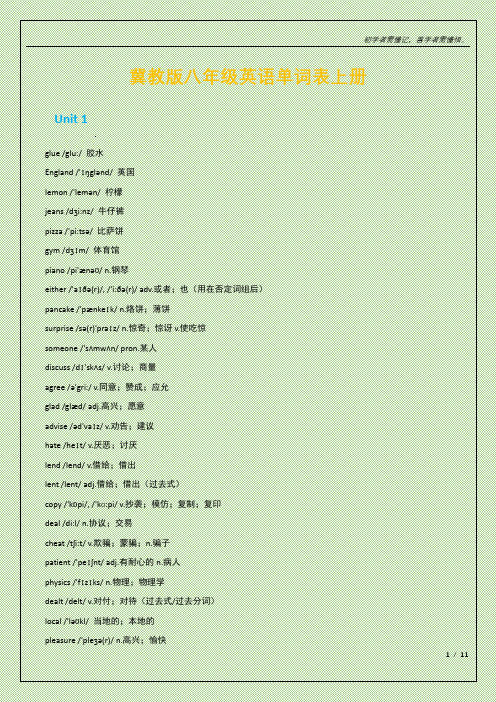
冀教版八年级英语单词表上册Unit 1glue /glu:/ 胶水England /'ɪŋglənd/ 英国lemon /'lemən/ 柠檬jeans /dʒi:nz/ 牛仔裤pizza /'pi:tsə/ 比萨饼gym /dʒɪm/ 体育馆piano /pi'ænəʊ/ n.钢琴either /'aɪðə(r)/, /'i:ðə(r)/ adv.或者;也(用在否定词组后)pancake /'pænkeɪk/ n.烙饼;薄饼surprise /sə(r)'praɪz/ n.惊奇;惊讶v.使吃惊someone /'sʌmwʌn/ pron.某人discuss /dɪ'skʌs/ v.讨论;商量agree /ə'gri:/ v.同意;赞成;应允glad /glæd/ adj.高兴;愿意advise /əd'vaɪz/ v.劝告;建议hate /heɪt/ v.厌恶;讨厌lend /lend/ v.借给;借出lent /lent/ adj.借给;借出(过去式)copy /'kɒpi/, /'kɑ:pi/ v.抄袭;模仿;复制;复印deal /di:l/ n.协议;交易cheat /tʃi:t/ v.欺骗;蒙骗;n.骗子patient /'peɪʃnt/ adj.有耐心的n.病人physics /'fɪzɪks/ n.物理;物理学dealt /delt/ v.对付;对待(过去式/过去分词)local /'ləʊkl/ 当地的;本地的pleasure /'pleʒə(r)/ n.高兴;愉快enemy /'enəmi/ n.敌人;仇人perform /pə(r)'fɔ:(r)m/ v.表演;执行embarrassed /ɪm'bærəst/ adj.窘迫的;害羞的ahead /ə'hed/ adv.向前面;在前面immediately /ɪ'mi:diətli/ adv.立即;马上;即刻following /'fɒləʊɪŋ/ adj.接着的;接下来的Cox /kɒks/ 考克斯(姓氏)Grant /grɑ:nt/ 格兰特(人名)Patrick /'pætrɪk/ 帕特里克(人名)3Sandra /'sɑ:ndrə/ 桑德拉(人名)angrily /'æŋgrɪli/ adv.愤怒地;生气地comb /kəʊm/ n.(作为装饰物的)发插;梳子knowledgeable /'nɒlɪdʒəbl/ adj.有丰富知识的;博学的pea /pi:/ 豌豆pod /pɒd/ 豆荚recent /'ri:snt/ adj.近来的;新近的Unit 2poor /pɔ:(r), pʊə/, /pʊr/ 可怜的;贫穷的into /'ɪntu:/ 进入;到……里because /bɪ'kɒz/, /bɪ'kɔ:z/ 因为mine /maɪn/ 我的tonigh /tə'naɪt/t 在今晚Bill /bɪl/ 比尔(男名)geography /dʒi'ɒgrəfi/, /dʒi'ɑ:grəfi/ n.地理(学)Lisa /'li:zə/ 莉萨(女名)quarter /'kwɔ:(r)tə(r)/ n.一刻钟;四分之一shout /ʃaʊt/ v.呼叫;喊叫seem /si:m/ v.好像;似乎;看来discussion /dɪ'skʌʃn/ n.讨论;商量physical /'fɪzɪkl/ adj.身体的finally /'faɪnəli/ adv.最后;最终cough /kɒf/, /kɔ:f/ v.&n.咳嗽since /sɪns/ conj.因为;既然;adv.从……以后;自……以来recently /'ri:sntli/ adv.不久前;最近suddenly /'sʌdənli/ adv.突然;忽然remind /rɪ'maɪnd/ v.提醒;使想起ocean /'əʊʃn/ n.大海;海洋tourist /'tʊərɪst/, /'tʊrɪst/ n.旅行者;观光者southern /'sʌðə(r)n/ adj.南方的convenient /kən'vi:niənt/ adj.便利的,方便的rush /rʌʃ/ v.&n.仓促;急促except /ɪk'sept/ prep.除……之外conj.除了;只是painter /'peɪntə(r)/ n.画家timetable /'taɪm,teɪbl/ n.时间表;课程表whisper /'wɪspə(r)/ n.低语,耳语librarian /laɪ'breəriən/ 图书管理员;图书馆馆长sometime /'sʌmtaɪm/ 某个时候download /,daʊn'ləʊd/ v.下载runner /'rʌnə(r)/ n.跑鞋Unit 3stamp /stæmp/ 邮票celebrate /'selɪbreɪt/ 庆祝top /tɒp/, /tɑ:p/ 上边,上面Thanksgiving /,θæŋks'gɪvɪŋ/ 感恩节balloon /bə'lu:n/ 气球postman /'pəʊstmən/ 邮递员size /saɪz/ 尺码;号breath /breθ/ 呼吸deep /di:p/ 深的tape /teɪp/ n.磁带;录音带;录像带past /pɑ:st/, /pæst/ prep.晚于;过(时间)adj.过去的post /pəʊst/ n.邮政round /raʊnd/ adj.圆形的blow /bləʊ/ v.吹candle /'kændl/ n.蜡烛yet /jet/ adv.(常用于否定句或疑问句)还;仍然wonder /'wʌmdə(r)/ v.想知道;琢磨however /haʊ'evə(r)/ adv.然而;不过touch /tʌtʃ/ v.感动;触摸choose /tʃu:z/ v.选择;挑选chose /tʃəʊz/ v.选择;挑选(过去式)meal /mi:l/ n.早(或午、晚)餐;一餐所吃的食物turkey /'tɜ:(r)ki/ n.火鸡anyway /'eniweɪ/ adv.而且;加之fit /fɪt/ v.适合;合身birth /bɜ:(r)θ/ n.出生;诞生record /'rekɔ:d/, /'rekərd/; /rɪ'kɔ:(r)d/ n.唱片;记录;v.录制;录(音)memory /'meməri/ n.记忆;回忆conversation /,kɒnvə'seɪʃn/, /,kɑ:nvər'seɪʃn/ n.交谈;谈话desser /dɪ'zɜ:(r)t/t n.(饭后)甜点;甜食address /ə'dres/, /'ædres/ n.住址;地址;通讯处lively /'laɪvli/ adj.生气勃勃的;(色彩)鲜艳的celebration /,selɪ'breɪʃn/ n.庆典;庆祝活动style /staɪl/ n.样式;款式hug /hʌg/ n.&v.拥抱;搂抱attend v.出席;参加/ə'tend/fashion n.流行款式;时兴式样/'fæʃn/view /vju:/ v.看;观看lunar /'lu:nə(r)/ 农历的thirteenth /,θɜ:'ti:nθ/ 第十三slide /slaɪd/ 滑梯blew /blu:/ v.(过去式)吹blown /bləʊn/ v.(过去分词)吹chosen /'tʃəʊzn/ v.选择;挑选(过去分词)album /'ælbəm/ n.相册;影集collection /kə'lekʃn/ n.收藏品gathering /'gæðərɪŋ/ n.聚会;集会mid- prefix /mɪd-/ 居中;在中间Unit 4thirsty /θɜ:(r)sti/ 渴的;口渴的sidewalk /'saɪdwɔ:k/ 人行道sound /saʊnd/ 听起来好像bank /bæŋk/ 银行neighbourhood /'neɪbəhʊd/ 街坊;附近downtown /,daʊn'taʊn/ 闹市区;市中心hockey /'hɒki/ 曲棍球;冰上曲棍球coffee /'kɒfi/, /'kɔ:fi/ 咖啡cherry /'tʃeri/ 樱桃fix /fɪks/ 修理across /ə'krɒs/, /ə'krɔ:s/ adv.&prep.过;穿过enjoyable /ɪn'dʒɔɪəbl/ adj.有乐趣的;令人愉快的through /θru:/ prep.以;凭借;穿过flu /flu:/ n.流行性感冒;流感mile /maɪl/ n.英里himself /hɪm'self/ pron.他自己Michael /'maɪkl/ 迈克尔(男名)perfect /'pɜ:(r)fɪkt/ adj.完美的;完全的treat /tri:t/ n.款待;招待v.招待;请(客)interview /'ɪntə(r)vju:/ v.采访;面试n.面试;访谈complete /kəm'pli:t/ v.完成biscuit /'bɪskɪt/ n.饼干block /blɒk/, /blɑ:k/ n.街区cost /kɒst/, /kɑ:st/ v.花费n.花费;价钱chat /tʃæt/ v.聊天whole /həʊl/ adj.全部的;整体的frozen /'frəʊzn/ adj.结冰的pond /pɒnd/ n.池塘bakery /'beɪkəri/ n.面包房entrance /'entrəns/ n.大门(口);入口(处)freeze /fri:z/ v.冻死;冻僵;结冰froze /frəʊz/ v.(过去式)冻死;冻僵;结冰tailor /'teɪlə(r)/ n.裁缝Unit 5advice /əd'vaɪs/ 建议artist /'ɑ:(r)tɪst/ 画家;艺术家scientist /'saɪəntɪst/ 科学家eighteen /,eɪ'ti:n/ 十八seventeen /,sevn'ti:n/ 十七actor /'æktə(r)/ 演员policewoman /pə'li:swʊmən/ 女警察company /'kʌmpəni/ 公司strict /strɪkt/ 要求严格的;严厉的goal /gəʊl/ 射门fisherman /'fɪʃə(r)mən/ 渔民pilot /'paɪlət/ 飞行员Helen /'helən/ 海伦(女名)number /'nʌmbə(r)/ n.号码;数字Alan /'ælən/ 艾伦(男名)model /'mɒdl/, /'mɑ:dl/ n.模型height /haɪt/ n.身高;高度grow /grəʊ/ v.种植;生长;发育grew /gru:/ v.种植;生长;发育(过去式)creative /kri'eɪtɪv/ adj.有创造力的;创造性的might /maɪt/ modal v.可能;可以engineer /,endʒɪ'nɪə/, /,endʒɪ'nɪr/ n.工程师page /peɪdʒ/ n.(书刊或纸张的)页,面,张fear /fɪə/, /fɪr/ v.&n.害怕;惧怕opposite /'ɒpəzɪt/, /'ɑ:pəzət/ prep.与……相对;在……对面;adj.对面的;另一边的business /'bɪznəs/n.生意;商业punish /'pʌnɪʃ/ v.处罚;惩罚choice /tʃɔɪs/ n.选择;挑选manager /'mænɪdʒə(r)/ n.经理;经营者overcome /,əʊvə(r)'kʌm/ v.克服;战胜(原形/过去分词)wise /waɪz/ adj.充满智慧的path /pɑ:θ/ n.小径crop /krɒp/ n.庄稼;作物diamond /'daɪəmənd/ 钻石grown /grəʊn/ v.(过去分词)生长;增加Lucas /'lu:kəs/ 卢卡斯(人名)airplane /'eəpleɪn/ n.飞机ambition /æm'bɪʃn/ n.抱负;雄心yearbook /'jɪəbʊk/ n.年刊;年报Unit 6transportation /,trænspɔ:(r)'teɪʃn/ 交通station /'steɪʃn/ (车)站invention /ɪn'venʃn/ 发明(名词)Britain /'brɪtn/ 英国space /speɪs/ 太空pull /pʊl/ 拉;拽than /ðən; ðæn/ 比easily /'i:zəli/ adj.容易地most /məʊst/ adv.&pron.最多;大多数Sam /sæm/ 萨姆(男名)able /'eɪbl/ adj.能够environment /ɪn'vaɪrənmənt/ n.环境probably /'prɒbəbli/, /'prɑ:bəbli/ adv.很可能;大概machine /mə'ʃi:n/ n.机器;机械装置passenger /'pæsɪndʒə(r)/ n.乘客;旅客imagine /ɪ'mædʒɪn/ v.想象;设想wheel /wi:l/ n.车轮;轮子allow /ə'laʊ/ v.允许;准许oil /ɔɪl/ n.油;食用油;石油rapid /'ræpɪd/ adj.迅速的;快速的railway /'reɪlweɪ/ n.铁路;铁道hometown /'həʊmtaʊn/ n.家乡;故乡born /bɔ:(r)n/ v.出生adj.天生的speed /spi:d/ n.速度seldom /'seldəm/ adv.不常;很少form /fɔ:(r)m/ n.形式;类型energy /'enə(r)dʒi/ n.力量;精力smooth /smu:ð/ 悦耳的;平滑的power /'paʊə(r)/ n.权力;力量backpack /'bækpæk/ n.背包;旅行包standard /'stændə(r)d/ n.标准;水平wing /wɪŋ/ n.翅膀;翼spaceship /'speɪsʃɪp/ n.宇宙飞船per /pə(r)/ prep.每,每一float /fləʊt/ v.漂浮;浮动skateboard /'skeɪtbɔ:(r)d/ n.滑板Jeremy /'dʒerəmɪ/ 杰里米(人名)cardboard /'kɑ:dbɔ:d/ n.硬纸板cart /kɑ:t/ n.手推车engine /'endʒɪn/ n.发动机;引擎fuel /'fju:əl/ n.燃料hoverboard /'hʌvəbɔ:d/ n.飞翔器imagination /ɪ,mædʒɪ'neɪʃn/ n.想像;想像力pedal /'pedl/ v.踏……的踏板;骑自行车;n.踏板presentation /,prezn'teɪʃn/ n.介绍;陈述steam /sti:m/ n.蒸汽动力;蒸汽transporter /træn'spɔ:tə(r)/ n.运输车;输送器Unit 7earth /ɜ:(r)θ/ 地球;世界garden /'gɑ:(r)dn/ 花园;菜园hobby /'hɒbi/, /'hɑ:bi/ 业余爱好stone /stəʊn/ 石头hen /hen/ 母鸡postcard /'pəʊstkɑ:(r)d/ 明信片real /rɪəl/ adj.真正的;真实的break /breɪk/ v.(使)破;裂;碎;损坏ticket /'tɪkɪt/ n.票;入场券common /'kɒmən/, /'kɑ:mən/ 普通的;常见的concert /'kɒnset/, /'kɑ:nsərt/ n.音乐会;演奏会anymore /,eni'mɔ:(r)/ adv.(常用语否定句和疑问句末)再也(不);(不)再adult /'ædʌlt/, /ə'dʌlt/ adj.成年的;成人的;n.成人;成年动物huge /hju:dʒ/ adj.巨大的;极多的land /lænd/ n.陆地;大地collect /kə'lekt/ v.收集;采集performance /pə(r)'fɔ:(r)məns/ n.表演;演出African /'æfrɪkən/ adj.非洲(人)的n.非洲人daily /'deɪli/ adj.每日的;日常的trade /treɪd/ n.贸易;交易v.做买卖;从事贸易support /sə'pɔ:(r)t/ v.&n.支持spare /speə/, sper/ 空闲的;不用的v.抽出;留出launch /lɔ:ntʃ/ v.发射challenging /'tʃælɪndʒɪŋ/ adj.挑战性的outdoor /'aʊtdɔ:(r)/ adj.户外的confidence /'kɒnfɪdəns/ n.信心giant /'dʒaɪənt/ n.巨人spin /spɪn/ vi.快速旋转Rex /reks/ 雷克斯(人名)Unit 8smart /smɑ:(r)t/ 聪明的Peter /'pi:tə(r)/ 彼得(男名)person /'pɜ:(r)sn/ n.人excellent /'eksələnt/ adj.极好的;优秀的program /'prəʊgræm/ n.节目Sue /su:/ 休(女名)heart /hɑ:(r)t/ n.内心;心脏mirror /'mɪrə(r)/ n.镜子talent /'tælənt/ n.天资;天赋college /'kɒlɪdʒ/, /'kɑ:lɪdʒ/ n.学院;大学;高等专科学校personal /'pɜ:(r)sənl/ adj.个人的;私人的impossible /ɪm'pɒsəbl/, /ɪm'pɑ:səbl/ adj.不可能存在或发生的;不可能的accept /ək'sept/ v.接受herself /hɜ:(r)'self/ pron.(she的反身代词)她自己ourselves /,aʊə(r)'selvz/ pron.(we的反身代词)我们自己continue /kən'tɪnju:/ v.持续;继续存在return /rɪ'tɜ:(r)n/ v.归还;回来;返还beat /bi:t/ v.敲打;打败nobody /'nəʊbədi/ pron.没有人;n.小人物stupid /'stju:pɪd/, /'stu:pɪd/ adj.愚蠢的;不明事理的junior /'dʒu:niə(r)/ adj.地位(或职位、级别)低下的fail /feɪl/ v.不及格;失败;未能(做到)sense /sens/ v.感觉到;意识到n.感觉;意识suppose /sə'pəʊz/ v.推断;料想Mexico /'meksɪkəʊ/ 墨西哥slowly /'sləʊli/ adv.缓慢地weak /wi:k/ adj.虚弱的;无力的average /'ævərɪdʒ/ adj.平均的voice /vɔɪs/ n.声音confident /'kɒnfɪdənt/ 有信心的award /ə'wɔ:(r)d/ n.奖;奖品;奖金strength /streŋθ/ n.力量stage /steɪdʒ/ n.段;步;步骤Georgia /'dʒɔ:dʒə/ 乔治亚(人名)Greece /gri:s/ 希腊(地名)Greek /gri:k/ n.希腊人Krista /'krɪstə/ 克里斯塔(人名)loser /'lu:zə(r)/ n.输者,败者microphone /'maɪkrəfəʊn/ n.麦克风;话筒misspelled /mɪs'speld/ 拼错的(过去分词)unique /ju'ni:k/ adj.独特的11/ 11。
presentation讲稿

presentation讲稿尊敬的各位听众:大家好!今天我站在这里,要和大家分享一些重要的观点和想法。
首先,让我们思考一下,在生活中,我们常常需要向他人传达信息、展示成果或者阐述观点。
而 presentation 就是这样一种有力的工具,它能够帮助我们有效地与他人进行沟通。
那么,什么是一个成功的 presentation 呢?它不仅仅是站在台上念念稿子,而是要能够吸引听众的注意力,让他们理解并记住我们想要传达的核心内容。
一个好的 presentation 从准备阶段就开始了。
我们需要明确自己的目标,也就是通过这次展示,我们想要达到什么样的效果。
是让听众了解一个新的产品?还是说服他们接受一个新的理念?明确目标之后,就要深入了解听众的需求和背景。
他们对这个主题已经有多少了解?他们最关心的是什么?只有这样,我们才能更好地调整内容和方式,让 presentation 更有针对性。
在内容的组织上,要有清晰的结构。
可以采用总分总的形式,先给出一个总体的概述,让听众对要讲的内容有个大致的了解。
然后,分点详细阐述各个重要的部分,每个部分之间要有逻辑的过渡。
最后,再进行一个总结,强调重点,加深听众的印象。
比如说,如果我们要介绍一个新产品,开头可以先讲讲市场的需求和现状,引出我们的产品。
然后分别介绍产品的特点、优势、使用方法等。
最后总结产品的价值和未来的发展前景。
而且,内容一定要简洁明了。
不要试图把所有的信息都塞进去,而是要挑选最重要、最有价值的内容。
用简单易懂的语言,避免使用过于专业或者复杂的术语,除非听众本身就是专业人士。
接下来,讲讲视觉效果。
幻灯片在 presentation 中起着重要的辅助作用,但千万不要让它成为主角。
幻灯片上的文字要简洁,图表要清晰,颜色搭配要协调。
不要使用过多的动画和特效,以免分散听众的注意力。
还有,在 presentation 的过程中,我们的表达能力也至关重要。
要保持良好的语速和语调,声音要洪亮、清晰,让每一个听众都能听得清楚。
英语presentation演讲稿
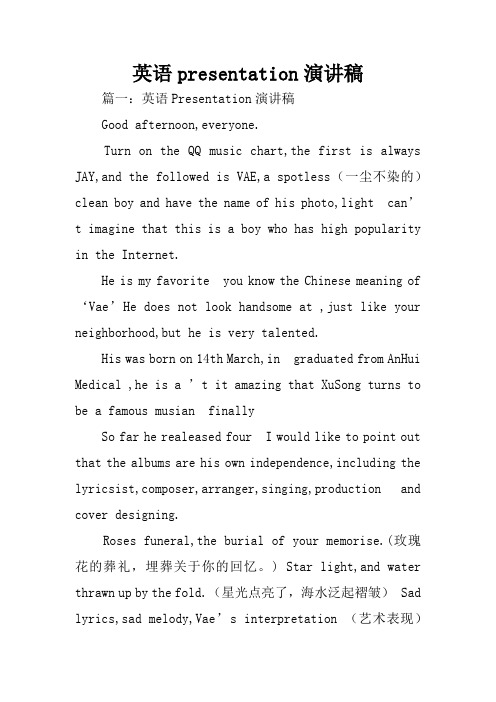
英语presentation演讲稿篇一:英语Presentation演讲稿Good afternoon,everyone.Turn on the QQ music chart,the first is always JAY,and the followed is VAE,a spotless(一尘不染的)clean boy and have the name of his photo,light can’t imagine that this is a boy who has high popularity in the Internet.He is my favorite you know the Chinese meaning of ‘Vae’He does not look handsome at ,just like your neighborhood,but he is very talented.His was born on 14th March,in graduated from AnHui Medical ,he is a ’t it amazing that XuSong turns to be a famous musian finallySo far he realeased four I would like to point out that the albums are his own independence,including the lyricsist,composer,arranger,singing,production and cover designing.Roses funeral,the burial of your memorise.(玫瑰花的葬礼,埋葬关于你的回忆。
) Star light,and water thrawn up by the fold.(星光点亮了,海水泛起褶皱) Sad lyrics,sad melody,Vae’s interpretation (艺术表现)of the plain with a little bit sad.Except for the intelligence of music,Vae also is good at his student’s ages,more than 20 articles were published by《萌芽》、《少年文艺》.He once wrote a composition《把伤痕当酒窝》which was used in JiangSu province as a College Entrance Examination ,he play computer very won the first of ‘xunfei’ in XX cup national webpage designing match in Anhui.Vae is a man who can tell us what is is my perserverance,his effort,his great idea,always inspire me.篇二:英语PRESENTATION演讲稿good afternoon, is my favorite you know the chinese meaning of ‘vae’he doesnot look handsome at ,just like your neighborhood,but he is verytalented.his was born on 14th march,in graduated from anhui medical,he is a ’t it amazing that xusong turns to be a famousmusian finallyroses funeral,the burial of your memorise.(玫瑰花的葬礼,埋葬关于你的回忆。
英语专业Presentation

Good morning, everyone! Today I want to share a piece of news with you. Romney clinches Republican presidential nomination WASHINGTON, 31 May- Mitt Romney clinched the Republicanpresidential nomination Tuesday with a win in the Texas primary, a triumph of endurance for a candidate who fought hard to win overskeptical conservative voters he must now fire up for the campaignagainst President Barack Obama.Romney must now energize conservatives who still doubt him, while persuading undecided voters that he can do a better job fixing thenation's struggling economy than Obama.This piece of news reminds me of that movie Swing Vote. I wonder whether there will be a swing vote in the election between Romney and Obama, and how they will deal with it.About that movie, I have thought about the perfect life we’re pursuiting for a long time.Maybe you still remember at the end of the movie, Bud asked the two candidates that “If we are the richest country in the world, how come so many of us can barely afford to liv e here?” Whoever the president of America is, the citizens’ purpose is to live better in the world. Can Romney or Obama lead America to a better future?Similarly, the same question is existing in China, too. We may have such a doubt that if China has been developing rapidly, why we are still feeling like poor men. The price of daily items is higher and higher. The gap between the poor and the rich is deeper and deeper. The relationship of human beings is more and more apathy.Just like Molly said, all the world’s greatest civilizations have followed the same path: from bondage to liberty, from liberty to abundant, from abundant to complacency, from complacency to apathy, from apathy back to bondage.Our China now is stuck into such a bad cycle like other country. I think you still remember the accident of little Yueyue. There is a rumor about in 2012 we’ll meet the doomsday of the earth. I don’t know whether it is true or not. What I know only is that if we can’t break the cycle, we are bound to see the doomsday of our society. The reason is we can hardly careabout others with our true heart. We all only care about the interest of ourselves.So, please think about it, what should we really do?。
八年级英语上册单词表冀教版
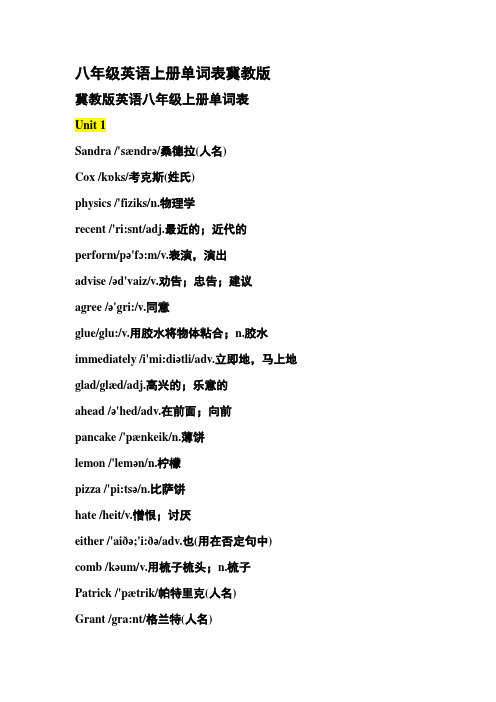
八年级英语上册单词表冀教版冀教版英语八年级上册单词表Unit 1Sandra /'sændrə/桑德拉(人名)Cox /kɒks/考克斯(姓氏)physics /'fiziks/n.物理学recent /'ri:snt/adj.最近的;近代的perform/pə'fɔ:m/v.表演,演出advise /əd'vaiz/v.劝告;忠告;建议agree /ə'gri:/v.同意glue/glu:/v.用胶水将物体粘合;n.胶水immediately /i'mi:diətli/adv.立即地,马上地glad/glæd/adj.高兴的;乐意的ahead /ə'hed/adv.在前面;向前pancake /'pænkeik/n.薄饼lemon /'lemən/n.柠檬pizza /'pi:tsə/n.比萨饼hate /heit/v.憎恨;讨厌either /'aiðə;'i:ðə/adv.也(用在否定句中) comb /kəum/v.用梳子梳头;n.梳子Patrick /'pætrik/帕特里克(人名)Grant /gra:nt/格兰特(人名)pea /pi:/n.豌豆pod/pɒd/n.豆荚copy /'kɒpi/v.抄写;复制;n.复制品surprise /sə'praiz/n.意想不到的事;v.使惊奇angrily /'æŋgrəli/adv.愤怒地;生气地lend /lend/v.(lent/lent)借给(某人钱或东西);借出cheat /tʃi:t/v.&n.作弊;欺骗following /'fɒləuiŋ/adj.接下来的;接着的gym/dʒim/n.体育馆;健身房embarrassed /im'bærəst/adj.尴尬的;窘迫的enemy /'enəmi/n.敌人;仇人deal /di:l/n.交易;v.(dealt/dealt)处理;应付someone /'sʌmwʌn/pron.某人;有人England /'inglənd/英格兰(地名)knowledgeable /'nɒlidʒəbl/adj.有丰富;知识的;博学的encourage /in'kʌridʒ/v.鼓励;支持discuss /dis'kʌs/v.讨论;谈论patient /'peiʃənt/adj.有耐心的;能忍耐的;n.病人piano /pi'ænəu/n.钢琴jeans/dʒi:nz/n.牛仔裤pleasure /'pleʒɔ/n.愉快,快乐;满足local /'ləukəl/adj.本地的,当地的;n.当地人Unit 2geography /dʒi'ɒgrəfi/n.地理(学)sometime /'sʌmtaim/adv.在某时painter /'peintə/n.画家timetable /'taim;teibl/n.课程表;时间表physical /'fizikl/adj.身体的;肉体的runner /'rʌnə/n.跑鞋except /ik'sept/prep.除了……之外tonight /tə'nait/adv.&n.今晚since /sins/prep.自……以后;从……以来;conj.因为;由于;既然poor /puə/adj.可怜的;贫穷的cough /kɒf/n.&v.咳嗽because /bi'kɒz/conj.因为seem /si:m/v.好像;似乎convenient /kən'vi:niənt/adj.方便的;便捷的Lisa /'li:zə/丽莎(人名)Bill /bil/比尔(人名)download /,daun'ləud/v.下载librarian /lai'breəriən/n.图书管理员suddenly /'sʌdənli/adv.突然地rush /rʌʃ/v.冲;奔into /'intu/prep.进入;到……里shout /ʃaut/v.喊whisper /'(h)wispə/v.低语,小声说话;n.低语,小声说的话quarter /'kwɔ:tə/n. 刻;四分之一recently /'ri:sntli/adv.最近;不久前;近来southern /'sʌðən/adj.南部的;来自南方的tourist /tuərist/n.游客,游人,观光者mine /main/pron.我的ocean /'əuʃn/n.海洋remind /ri'maind/v.使想起;提醒finally /fainəli/adv.最后;终于discussion /di'skʌʃn/n.讨论,谈论Unit 3celebrate /'selibreit/v.庆祝mid-/mid/prefix居中;在中间lunar /lu:nə/adj.月球的;农历的,阴历的round /raund/adj.圆的;adv.周而复始地celebration /seli'breiʃn/n.庆祝;庆贺however /hau'evə/adv.然而;不过thanksgiving /θæŋks'giviŋ/n.感恩节wonder /'wʌndə/v.好奇;想知道memory /'meməri/n.回忆;记忆;记忆力past /pa:st/n.过去;昔日;过去的事情;prep.晚于;在……之后album/'ælbəm/n.(收藏照片、邮票等)簿,册;唱片集;专辑choose /tʃu:z/v.(chose/chosen)选择collection /kə'lekʃn/n.收藏品slide /slaid/n.幻灯片;v.(使)滑行;滑动record /ri'kɔ:d/v.录像;录音;记录;/'rekɔ:d/n.记录;记载view /vju:/n.观点,想法lively /'laivli/adj.生动有趣的;充满活力的birth /bə:θ/n.出生;生育attend /ə'tend/v.参加;出席touch /tʌtʃ/n.接触;联系;v.触摸;接触size /saiz/n.尺寸;大小fit /ft/v.(fitted/fitted或fit/fit)合适;合身anyway /'eniwei/adv.无论如何slyle /stail/n.款式hug /hʌg/n.&v.拥抱turkey /'tə:ki/n.火鸡meal /mi:l/n.(一)餐;(一顿)饭食gathering /'gæðəriŋ/n.聚会;集会dessert /di'zə:t/n.甜点conversation /,kɒnvə'seiʃn/n.交谈;对话thirteenth /θə:'ti:nθ/n um.&adj.&adv.第十三(的)tape /teip/n.胶带post /pəust/v.邮寄yet /jet/adv.还;仍旧(用于否定句中)address /ə'dres/n.地址top /tɒp/n.顶部;(物的)上面stamp /stæmp/n.邮票postman/'pəustmən/n.邮递员;邮差fashion /fæʃn/n.流行的式样;时尚balloon /bə'lu:n/n.气球candle /'kændl/n.蜡烛deep /di:p/adj.深的breat h /breθ/n.(呼吸的)空气;吸气blow /bləu/v.(blew/blown)吹Unit 4neighbourhood /'neibəhud/n.街区;城区;(统称)某街区(或城区)的居民perfect /'pə:fikt/adj.美好的;完美的;理想的thirsty /'θə:sti/adj.渴的complete /kəm'pli:t/v.完成;结束bakery /'beikəri/n.面包店biscuit /'biskit/n.饼干downtown /'dauntaun/adv.(在/向)城市商业中心或市中心coffee /'kɒfi/n.咖啡through /θru:/prep.穿过cherry /'tʃeri/n.樱桃sidewalk /'saidwɔ:k/n.人行道himself /him'self/pron.他自己entrance /'entrəns/n.进入;入口Michael /'maikəl/迈克尔(人名)pond /pɒnd/n.池塘freeze /fri:z/v.(froze/frozen)冻死;冻僵;结冰hockey /'hɒki/n.冰球;曲棍球block /blɒk/n.街道;栋,幢bank /bæŋk/n.银行whole /həul/adj.整个的;完全的chat /tʃæt/v.闲聊;闲谈;聊天cost /kɒst/v.(cost/cost)花费interview /'intəvju:/v.&n.面试;采访;访谈tailor /'teilə/n.裁缝fix/fiks/v.修理;维修sound /saund/v.听起来;n.声音enjoyable /in'dʒɔiəbl/adj.令人愉快的treat /tri:t/n.美食;款待flu /flu:/n.流行性感冒mile /mail/n.英里across /ɔ'krɒs/prep.横过……;从……一边到另一边Unit 5might /mait/v.aux.可能,也许scientist /'saiəntist/n.科学家grow /grəu/v. (grew/grown)生长;增加engineer /endʒi'niə/n.工程师;技师page /peidʒ/n.页yearbook /'jiəbuk/n.年刊;年报airplane /'eəplein/n.飞机pilot /'pailət/n.飞行员fear /fiə/n.&v.害怕;惧怕;担忧height /hait/n.高度;身高overcome /əuvə'kʌm/v.克服;解决model /'mɒdəl/n.模型advice /əd'vais/n.建议;劝告diamond /'daiəmənd/n.钻石spell /spel/v.(spelled/spelled或spelt/spelt拼写;拼出;拼成number /'nʌmbə/n.数字;号码seventeen/sevn'ti:n/num.十七eighteen /ei'ti:n/num.十八opposite /'ɒpəzit/n.&adj.相反(的);相对的Lucas /lukəs/卢卡斯(人名)crop /krɒp/n.庄稼;作物manager /'mænidʒə/n.经理;管理人business /'biznəs/n.买卖;生意company /'kʌmpəni/n.公司creative /kri'eitiv/adj.创造性的Alan /'ælən/艾伦(人名)goal /gəul/n.目标ambition /æm'biʃn/n.抱负;雄心fisherman /'fiʃəmən/n.渔夫,渔民policewoman /pə'li:swumən/n.女警察artist /'a:tist/n.艺术家;(尤指)画家choice /tʃɔis/n.选择path /pa:θ/n.途径;小路strict /strikt/adj.严厉的;严格的punish /'pʌniʃ/v.处罚;惩罚Helen /'helən/海伦(人名)wise /waiz/adj.聪明的;智慧的;明智的actor /'æktə/n.(男)演员Unit 6transportation /trænspɔ:'teiʃn/n.运输;交通hometown /'həumtaun/n.故乡;家乡Britain /'britn/英国(地名)seldom/'seldəm/adv.不常;罕见;难得rapid /'ræpid/adj.快速的steam/sti:m/n.蒸汽engine /'endʒin/n.发动机;引擎wheel /wi:l/n.车轮;轮子born /bɔ:n/v.出生;诞生;产生(仅用于被动语态)passenger/'pæsindʒə/n.乘客railway /'reilwel/n.铁路most /məust/adj.(many或much的最高级)大多数的;最多的;adv.(much的最高级)最;n.最大量;最多数station /'steiʃn/n.站;所;车站easily /i:zili/adv.容易地standard /'stændəd/n.标准;规格speed /spi:d/n.速度per /pə:/prep.每,每一Jeremy /'dʒerəmi/杰里米(人名)wing/w iŋ/n.翅膀pull /pul/v.拉;拖cart /ka:t/n.手推车skateboard /'skeitbɔ:d/n.滑板able /'eibl/adj.能,能够(用作情态动词)power /'pauə/v.驱动;推动;n.能量;力量appear /ə'piə/v.出现;呈现;来到machine /mə'ʃi:n/n.机器;机械space /speis/n.太空;空间;距离spaceship /'speisʃip/n.宇宙飞船imagine /i'mædʒin/v.想像;想到environment /in'vairənmənt/n.环境presentation /prezn'teiʃn/n.介绍;陈述invention /in'venʃn/n.发明;创造backpack /'bækpæk/n.背包cardboard /'ka:dbɔ:d/n.硬纸板fuel /'fju:əl/n.燃料oil /ɔil/n.油;石油probably /'prɒbəbli/adv.大概;很可能;也许imagination /imædʒi'neiʃn/n.想像;想像力Sam /sæm/萨姆(人名)hoverboard /'hɒvəbɔ:d/n.飞翔器smooth /smu:ð/adj. 平稳的;平坦的;光滑的float /fləut/v.漂浮transporter /træn'spɔ:tə/n.运输车;输送器allow /ə'lau/v.允许form /fɔ:m/n.形式;形状pedal /'pedl/v.踏……的踏板;骑自行车;n.踏板than /ðæn,ðən/prep.&conj.比energy /'enədʒi/n.能量Unit 7hobby /'hɒbi/n.爱好spare /speə/adj.空闲的earth /ə:θ/n.地球;大地collect /kə'lekt/v.山收集;集合stone /stəun/n.石头;石块concert /'kɒnsət/n.音乐会ticket /'tikit/n.票;券trade /treid/v.&n.用……进行交换;交易garden/'ga:dn/v.从事园艺;种植;n.花园;果园confidence /'kɒnfidəns/n.自信postcard /'pəustka:d/n.明信片outdoor /'autdɔ:/adj.户外的;露天的Rex /reks/雷克斯(人名)giant /'dʒaiənt/n.巨人;伟人;adj.巨大的huge /hju:dʒ/adj.极大的;巨大的African /'æfrikən/adj.非洲(人)的hen /hen/n.母鸡anymore /'enimɔ:/adv.再也(不);不(再)launch /lɔ:ntʃ/v.发射;使……运动;送上轨道adult /'ædʌlt/n.成年人break /breik/v.(broke/broken)弄坏;损坏;n.间歇;休息;间断land /lænd/v.登陆;降落;n.陆地;土地challenging /'tʃælindʒiŋ/adj.挑战性的;考验能力的spin /spin/v.(使)快速旋转performance /pə'fɔ:məns/n.表演;演出common /'kɒmən/adj.普通的;一般的real /riəl/adj.真正的;确实的support /sə'pɔ:t/v.&n.支持;拥护;鼓励daily /'deili/adv.每日;每天;adj.每日的;日常的Unit 8unique /ju:'ni:k/adj.独特的suppose/sə'pəuz/v.假定;认为ourselves /auə'selvz/pron.我们自己person /'pə:sn/n.人talent /tælənt/n.才智;天赋personal/'pə:sənl/adj.个人的strength /streŋθ/n.长处;力量sense /sens/n.意义;感觉Georgia /'dʒɔ:dʒjə/乔治亚(人名)Greece /gri:s/希腊(地名)nobody /'nəubədi/pron.没有人return /ri'tə:n/v.&n.返回;回应Greek /gri:k/adj.希腊(人)的;n.希腊人junior /'dʒu:niə/adj.&n.初级(的);儿童(的)continue /kən'tinju:/v.继续;延续Sue /sju:/苏(人名)average /'ævəridʒ/adj.一般的;平均的;n.平均;一般水平stupid /'stju:pid/adj.愚蠢的;傻的smart /sma:t/adj.聪敏的impossible /im'pɒsəbl/adj.不可能的weak /wi:k/adj.弱的;无气力的mirror /'mirə/n.镜子microphone /'maikrəfəun/n.麦克风;话筒program/'prəugræm/n.节目;程序;方案;计划confident /'kɒnfidənt/adj.自信的voice /vɔis/n.嗓音excellent /'eksələnt/adj.优秀的;杰出的;好极了;棒极了stage /steidʒ/n.舞台heart /ha:t/n.心;心脏beat /bi:t/v.&n.((beat/beaten)跳动;敲打(声)slowly /'sləuli/adv.慢慢地herself /hə:'self/pron.她自己Peter /'pi:tə/彼得(人名)loser /'lu:zə/n.输者,败者fail /feil/n.&v.不及格;失败Krisla /'krislə/克里斯塔(人名)Mexico /'meksikəu/墨西哥(地名)misspelled/₁mis'speld/拼错的(misspell的过去分词) accept /ək'sept/v.接受;承认award /ə'wɔ:d/n.奖状;奖品college /'kɒlidʒ/n.学院;大学.。
做英文presentation的常用语资料
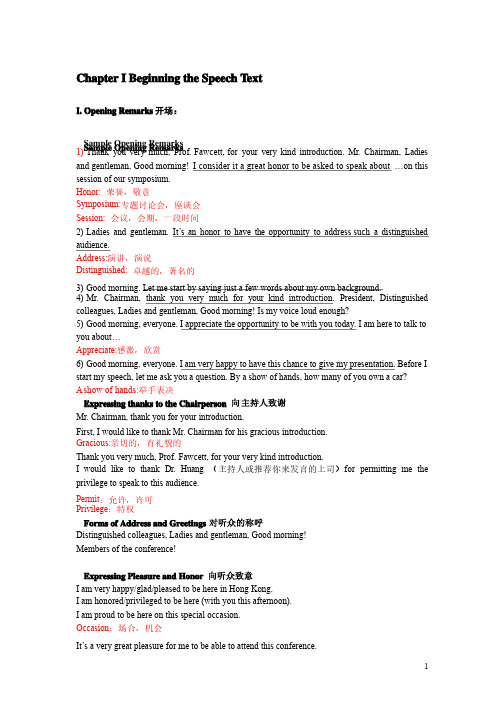
Chapter I Beginning the Speech T extI. Opening Remarks开场:Sample Opening Remarks1) Thank you very much, Prof. Fawcett, for your very kind introduction. Mr. Chairman, Ladies and gentleman, Good morning! I consider it a great honor to be asked to speak about …on this session of our symposium.Honor: 荣誉,敬意Symposium:专题讨论会,座谈会Session: 会议,会期,一段时间2) Ladies and gentleman. It It’’s an honor to have the opportunity to address such a distinguished audience.Address:演讲,演说Distinguished: 卓越的,著名的3) Good morning. Let me start by saying just a few words about my own background.4) Mr. Chairman, thank you very much for your kind introduction. President, Distinguished colleagues, Ladies and gentleman, Good morning! Is my voice loud enough?5) Good morning, everyone. I appreciate the opportunity to be with you today. I am here to talk to you about……you aboutAppreciate:感激,欣赏6) Good morning, everyone. I am very happy to have this chance to give my presentation. Before I start my speech, let me ask you a question. By a show of hands, how many of you own a car?A show of hands:举手表决Expressing thanks to the Chairperson 向主持人致谢Mr. Chairman, thank you for your introduction.First, I would like to thank Mr. Chairman for his gracious introduction.Gracious:亲切的,有礼貌的Thank you very much, Prof. Fawcett, for your very kind introduction.I would like to thank Dr. Huang (主持人或推荐你来发言的上司)for permitting me the privilege to speak to this audience.Permit:允许,许可Privilege:特权Forms of Address and Greetings对听众的称呼Distinguished colleagues, Ladies and gentleman, Good morning!Members of the conference!Expressing Pleasure and Honor 向听众致意I am very happy/glad/pleased to be here in Hong Kong.I am honored/privileged to be here (with you this afternoon).I am proud to be here on this special occasion.Occasion:场合,机会It It’’s a very great pleasure for me to be able to attend this conference.I consider it a great honor to be asked to speak about …on this session of our symposium/ at this conference..It is a great pleasure to be given the honor of first speaker on this important topic.Others 细节,如确认话筒音量Can you hear me all right?Is my voice too loud?Reference to the Audience 与听众呼应I can see many of you are from ……department.I can see many of you are fromI know many of you are familiar with this topic.ou all look as though you’’ve heard this before.Y ou all look as though youI understand that you’’ve all traveled a long way./ After hours of conference, you must feel a little I understand that youtired. Now I’’d like you to see an interesting topic…tired. Now III. Introducing the Subject and the outline of the Presentation引入话题Background InformationI would like to start by briefly reviewing the history of …Let us start with the theoretical basis of this new technique.Theoretical:理论的,假设的To begin with, we have to consider the principle.Principle:原则,准则I think it would be best to start out by looking at a few slides.Start out:开始Slide:幻灯片I should like to preface my remarks with a description of the basic idea.Preface:作为……的开端,引语May I begin with a general outline of this project?First, I shall explain to you why this new program is correct and feasible.Feasible:可行的T opicI would like to concentrate on the problem of …….I shall devote my talk to the …….Devote……to:把……专用于,致力于I want to confine my talk to the latest developments in …….Confine to:限于……之内Today, I am going to give a talk on …….My topic today will deal with …….In my presentation this morning, I' 11 limit myself to three major points only.Now, I would like to address myself to the most important aspect of this problem..Outlining 大纲My talk today consists of two parts. One is... and the other is...Consist of:由……组成I've divided my presentation into four parts.Divide into:分成I shall first talk about ... and then touch on... and finally discuss ... Touch on:涉及,与……有关I would like to divide my talk into two parts. The first part deals with…, the second part concerns ...Concern :涉及My presentation will be given in four parts. The first part deals with ... The second part relates to... The third part concerns ... And the last part discusses …Purpose/Objective 目的The purpose of this presentation is to...Th This talk is designed to…is talk is designed to…Be designed to: 旨在……旨在……Comprehensive Samples 例子Sample 1Thank you, Mr. Chairperson, Mr. Director-General, distinguished members of the ILO's Governing Body and friends. I welcome this opportunity to be here today, with an Organization which in many ways belongs to all of us workers. I can think of, in fact, no other international body that one can claim as one's own so unambiguously.I have also had a longstanding formal association with the ILO. Many of my early pieces on women and technological change and on land rights were published by the ILO, as well as was the work of many other scholars. It is therefore a pleasure for me to be here on this important Symposium.The canvas of the Symposium is very large. I will focus on two aspects of gender inequality that centrally effect millions of women as workers but perhaps have failed to receive the attention they deserve. First, the gender gap in command over property and Productive assets and, second, gender biased social perceptions and social norms.Expressions on Other Occasions 其他情况Correcting the Title of the Presentation 修改演讲标题First of all, I would like to mention that the title of my presentation should be ... Please allow me to correct a mistake in the title of my speech which appeared in the program. Instead of... it should read...Reading. Another Person's Paper 宣读别人的报告Sometimes you are selected to read another person's paper, as he or she is absent.I shall read a paper by Dr. Li from Guangzhou, china, who regrets that he c ould not be here. The title of his paper is...I'm going to read the paper by Dr. Wang. It's a great pity that, because of a health problem, he could not be here.I was asked by the author to read his paper. He apologizes for not being able to come here.The next speaker, Prof. Zhang, regrets that she could not be here and has submitted her paper to me. I am not sure if I can present it as well as she expected. I am not sure whether I' 11 be able to be very confident in answering specific questions. However, I am somewhat familiar with his work, so I' 11 try my best.Checking the MicrophoneFirst I want to check if all of you can hear me clearly.Am I speaking clearly and loudly enough for those in the rear of the room?Rear:后面If those in the rear of the room can hear me, would someone please raise his hand?Can you hear me clearly?Can you hear me if I am away from the microphone?Is the microphone working?Chapter II Developing the Speech TextI. Announcing the Beginning of the Speech TextextI. Announcing the Beginning of the Speech TTo begin with, I would like to talk about a principle.I think it would be best to start out by looking at some pictures.The first thing I would like to talk about is the definition of the terms which I’11 use in my presentation.II. Shifting to the Next Main PointWell, let's move on to the next point.We will now come to the second problem.Turning to the next question, I' 11 talk about the stages of the procedure.As the second topic, I shall stop here. Now let' s turn our attention to the third topic.Now, let's move away from the first part and switch over to the next part of my presentation. Switch over:转换,变换That's all for the introduction and now we can go on to the literature review.Next, I would like to turn to a more difficult problem.The next point I'd like to talk about is the feasibility of this project.That brings me to my second point.III. Resuming the T opicLet' s come back to what I said in the first part of my speech.I want to return to the first part of my presentation.This brings me back to the question of security.At this point I would like to refer again to the question of methods in the first part of my lecture. Refer to:查阅,有关Referring again to the first question, I think...I'll deal with it later.I'll touch upon that point in a moment.IV. Introducing the Supporting MaterialsI think this part is the most difficult, so I'll explain it in greater detail.I think this part of my paper is most important, so I plan to spend more time on it.Please allow me to deal with this matter more extensively.Being the most important part of my presentation, I will elaborate on it with more slides. Elaborate:详尽阐述Indicating the Points BrieflyLimited by the time available, I can only give you a very brief account of this matter.Account:解释,说明This point has been talked about repeatedly in this symposium, so I am not going to spend too much time on it.Let's go through the following points very rapidly.I shall not go over all these explanations. My time is running short. So I'’11 be brief.V. Repairing a Slip of T one 口误May I have the lights, I mean the slides.The temperature increased, I shall say decreased.The population is 13 million, sorry, 31 million.The exchange rate dropped from 2.5 to 1.8, I beg your pardon, 1.9.VI. Expressions Concerning Audio-Visual Aids 有关视听设备的表达Could we have the lights off? And the first slide, please.Lights off, first slide, please.Dim the lights, and first slide, please.The slide is not so clear. Please darken the room a little more.Could you please turn on the lights, please?Now, we can have the lights on.Please switch on the lights.Lights on, please.VI. Explaining the Contents on the SlidesThis slide demonstrates ...Demonstrate:展示,演示On this slide, you can see...This curve in this slide shows...This figure in this slide exhibits...This table on this slide presents...This diagram on this slide depicts...The picture on this slide shows ...The photomicrograph on this slide shows ...The flow-chart on this slide points out...The circuit diagram on this slide represents~...~VII. Demanding to Show the Next SlideMay I proceed to the next slide, please?I think we can move on to the next slide.Let me show you the next slide.Now, we can go on to the next slide. Next slide, please.Next, please. VIII. Returning to the Previous SlideTo make a comparison, can we return to the first slide, please?Let's go back. No, not this one. One back. Back one more. Y Let's go back. No, not this one. One back. Back one more. Yes, that’es, that’es, that’s it. Thank you. s it. Thank you.May I go back two slides, please?Could you return to the second slide?May we have the previous slide again?IX. Correcting a MistakeSorry, this one is in the wrong order. May I have the next one?Oh, this slide is misplaced. Please skip over it. Y Oh, this slide is misplaced. Please skip over it. Yes, this is the correct one. es, this is the correct one.Skip over :跳过I'm afraid I didn't ask for this slide. Can we go back to the previous one? Please.No, not this one. Next, please. Y No, not this one. Next, please. Yes, this is the one I need. Thank you. es, this is the one I need. Thank you.Sorry, there seems to be one slide missing.X. Indicating the Speed of Running SlidesLet's go through the following slides rapidly.The following three slides we will go through quickly without explanation.Wait a minute, please. I want to say more about this slide.Because of the shortage of time, I' ll have to omit the following slides. Omit:省略Time is up, let's come to the last slide directly.Chapter III Ending the Speech T Chapter III Ending the Speech Textext I. Signaling the Beginning of the End PartLet Let’’s look at what I have talked about.Well, that brings me to the end of my presentation. This last slide is a brief summary of what I have talked about.Before I stop/finish, let me just say... To close my speech, I' 11 show you the last slide.Now I'd like to summarize my talk.Summarize:总结To summarize, I have talked about three aspects of the cancer problem: ...Aspect:方面Finally, as a summary statement, I would like to sum up the major points I have made.Sum up:总结II. SummarizingLet me just run over the key points again.Run over:造访,回顾造访,回顾I'll briefly summarize the main issues.In conclusion\In closing\In a word\To sum up\In brief\Briefly\All in all\Finally,…III. ConcludingAs you can see, there are some very good reasons ...To sum up, my conclusion is that the present program is the best one.In conclusion ...Let me conclude my talk with the following comments. In conclusion, I would like to point out the following aspects.I'd like to leave you with the following conclusion.IV . QuotingLet me close by quoting Dr. Einstein, the famous physicist, who said that…I would like to come to a close by quoting what Sir Newton once said...Therefore, I would suggest that we...I'd like to suggest...As far as I'm concerned, the only solution to the problem is...V . ClosingThat's all, thank Y That's all, thank You. ou.That's the end of my presentation.So much for my speech, thank you.Thank you for your attention.Thank you for your listening.VI. Samples 'Finally, we can draw the conclusion: edge detection and denoising are two important branches of image processing. If we combine edge detection with denoising, we can overcome the shortcomings of the commonly-used denolsing methods and without blurring the edge notably.Furthermore, there are many denoising and edge detection methods now. Different methods are suitable for different types of images and noise models. We can do further research on how to combine these various denoising and edge detection methods according to the content of the images and nature of noise.That's all for my talk. If you have any questions, please do not hesitate to ask me. I'm quite willing to discuss them with you at any time, Thank you.Chapter IV Asking and Answering QuestionsI. Inviting QuestionsSo, let's throw it open to questions.Now I' d like to answer any questions, if you have any.Now I am ready to answer your questions, if any.I'd be glad to try and answer any questions.Are there any questions?Any questions?II. Raising QuestionsSignaling Y Signaling Your Intention to Ask a Questionour Intention to Ask a Question Signal: 向……发信号I want to ask Dr. bi a question.I have a guest ion for Dr. Anderson.Mr. Smith, I have a question to ask you.There is a question I'd like to ask Prof. Li.A question for Mr. Liu. One question, Dr. Wei.Could I ask you a question, Prof. Li?Expressing Y Expressing Your Attitudeour Attitude (Before asking your question, you can express your positive attitude or make a comment on the speaker's presentation. For example,)Dr. Johnson, I was fascinated by your description of your study Dr. Johnson, I was fascinated by your description of your study, but what will happen if... , but what will happen if... Fascinate:使着迷Mr. Li, you did splendid work! Just one question.Splendid: 极好的,令人满意的(Then Asking the Specific Question )Y ou mentioned very briefly that you used two experiments that were the same.Would you please elaborate on that point?Would you be so kind as to give me more information about the method of your experiment?Would you tell me the reason why ……?Comprehensive SamplesCongratulations, Dr. Li. I can't help but admire your achievement. But I want to know what's your attitude toward abuse of antibiotics?May I ask you a question? How does subjective evaluation differ from objective evaluation?First, I'd like to say your research is very interesting. May I ask two questions? Do you see any relation between cigarette smoking and peptic ulcers? And what advantage do you expect by using this approach?III. Response to QuestionsAsking for RepetitionPardon, I couldn't hear what you said.I beg your pardon, I didn't catch what you said.I'm sorry I forgot your first question. Would you be so kind as to say it again?I'm not quite sure what your question is.I didn't quite get the last point of your question.Y ou mean, there may be some mistake in the calculation?Are you referring to the significance of the difference?Are you suggesting that the temperature might have affected the results?If I understand you correctly, you are saying/asking...I didn't quite catch that.Could you go over that again?I'm not sure what you're getting at.Welcoming the QuestionWelcome the question by saying "thank you" or comment ing on it saying "That’s a good question"ing on it saying "That’s a good question" or "That's a challenging question."This is a very good question.Thank you for that question.I'm glad this question has been brought up-I appreciate that question.This is a hard question.This is an interesting question.This is a big question.I'd be delighted to answer your question.I'll try to answer this question very briefly.In answer to your question, I would say that...I can only provide a partial answer to that question.Let me try to answer your questions one by one.My answer to your first question is...May I answer your second question first?Thank you for that question. This is a challenging question and I'm afraid I can only provide a partial answer to it. Anyway, I'll try my best to answer it.Responding to Difficult or Challenging QuestionQuestion: So what happens if the new budget isn't approved?Answer (1): We've spent two months preparing the new budget. It's a good budget and we're confident we'll get approval to put it into practice.Answer (2): There is too much supposition in the question for me to give a sound answer. Responding to Improper QuestionI appreciate your interest in my research, but I just don't want to talk about it now. Let's talk about something else.I'd rather not say.Why do you want to know?ou Do Not KnowResponding to the Questions You Do Not KnowResponding to the Questions YIf you don't know the answer to a particular question, simply admit that you don't know. Say something like this:"I'm sorry. I don't happen to know the answer to that question, but I'll be happy to check into it for you."Here are some further examples:I don't think I can answer your question.I wish I could answer your question, but unfortunately I have no good answer.I'm not sure that I can answer your question. What I'm going to say is not quite an answer to your question.Another technique to cope with the situation is to direct the attention to another expert who may know it or you can use the audience. Ask if anyone could help the questioner and hence it won't be necessary for you to admit that you do not know the answer. See examples below.I think that question could be better answered by Dr. Liu than by me.I think perhaps Dr. Chen would be better able to answer this question.Prof. Li would be a better person to answer your question since he has done a lot of work in this field.Dr. Sawyer is perhaps in a better position to tell us something about it.Perhaps my colleague Dr. Emery here has some better ideas.。
研究生presentation模板

研究生Presentation模板一、概述研究生Presentation是研究生完成学位论文的一个重要环节,也是展示自己研究成果的重要机会。
而一份好的Presentation模板能够有效地帮助研究生展示研究成果,提高演讲效果,因此选择合适的Presentation模板至关重要。
下面将结合国内外研究生Presentation 模板的特点和应用,为大家推荐几种值得借鉴和使用的模板。
二、国外研究生Presentation模板1. Harvard University Presentation Template哈佛大学的Presentation模板以简洁大方、美观大方为特点,使用了哈佛大学的蓝色为主色调,Logo和文字排版都符合哈佛大学的风格,整体风格显得大气、高端。
此模板可以直接在哈佛大学全球信息站上下载,也可以在各大模板全球信息站上找到适用于PowerPoint和Keynote的版本。
2. Stanford University Presentation Template斯坦福大学的Presentation模板同样以简洁、大方为设计理念,但使用了斯坦福大学的红色为主色调,整体风格更加动感、时尚。
模板风格符合斯坦福大学的学术氛围,适合于展示科研成果或学术报告。
该模板同样可以在斯坦福大学全球信息站下载或在各大模板全球信息站上找到。
三、国内研究生Presentation模板1. 清华大学Presentation模板清华大学的Presentation模板以简洁大方、稳重大气为设计理念,使用了清华大学的绿色为主色调,Logo和文字排版都符合清华大学的风格,整体风格显得朴素、内敛。
该模板符合清华大学的学术氛围,适合于展示科研成果或学术报告。
在清华大学校内全球信息站上可以找到该模板的下载信息。
2. 北京大学Presentation模板北京大学的Presentation模板同样以简洁、大方为设计理念,但使用了北京大学的红色为主色调,整体风格更显得雄壮、气派。
大学英语课前演讲presentation

Choose an appropriate language style based on the content of the speech and the characteristics of the audience, such as formal, informal, or humorous.
01
Introduction
Theme Introduction
Theme
The impact of technology on our lives
Description
The presentation will focus on how technology has transformed our lives in various aspects, including communication, education, entertainment, and work
Use visual aids
Use visual aids such as slides, charts, or handouts to support your presentation and help you move through your material more quickly
Practice makes perfect
02 03
Correct grammar and spelling
Ensure that your language is grammatically correct and free of spelling errors This helps to understand a sense of professionalism
英文presentation范文

英文presentation范文Ladies and Gentlemen,Good morning! Today, I am honored to share with you the essence of effective English presentation skills. Presentation skills are crucial in today's professional world, as they act as a bridge between ideas and execution. Whether you're a student, a researcher, or a business professional, mastering the art of presenting ideas in English can open doors to countless opportunities.**1. Structure Your Presentation**The first step to crafting an impactful presentation is to structure it effectively. Begin with a clearintroduction that sets the context for your topic. Follow this with a well-defined body, where you present your key points and evidence to support them. Conclude with a summary that ties everything together and leaves a lasting impression.**2. Use Engaging Content**Content is king, and it's crucial to make it engaging and relevant. Use stories, examples, and analogies toillustrate your points and keep your audience engaged. Avoid dry facts and figures, and instead, present them in a way that's easy to understand and remember.**3. Practice Your Delivery**Delivery is everything. Practice your presentation repeatedly to ensure fluency and confidence. Pay attention to your tone, pace, and volume to ensure you maintain the attention of your audience. Use visual aids like PowerPoint slides to enhance your message and make it more memorable. **4. Interact With Your Audience**A great presentation is not just about speaking; it's about engaging with your audience. Use questions, polls, and group discussions to involve your listeners actively. Encourage feedback and use it to your advantage, adjusting your content and delivery accordingly.**5. Dress for Success**Appearance matters. Dress professionally and appropriately for your presentation, as it sets the tonefor your credibility and professionalism. A well-dressedpresenter is more likely to command respect and attention from their audience.In conclusion, effective English presentation skillsare a combination of structure, engaging content, confident delivery, audience interaction, and professional attire. By following these tips, you can take your presentations tothe next level and captivate your audience with your ideas and insights. Thank you for your time, and I look forwardto hearing your thoughts and feedback.**中文翻译与拓展****英文演讲技巧:成功的蓝图**女士们、先生们:早上好!今天,我很荣幸能与大家分享有效的英文演讲技巧的核心内容。
大学英语10分钟presentation

Share the reasons and interests for choosing an English language and literature major.
Language expression
During the sharing process, attention should be paid to the accuracy and fluency of language expression to avoid grammar errors or unclear expression.
Interaction and communication
During the sharing process, it is possible to interact and communicate with students, guide them to participate in discussions and thinking, and enhance their sense of participation and interactivity.
Promoting personal development
Summary
Describe how English can help individuals achieve career transformation and enhance professional skills, as well as its practical applications in academic research, tourism, and other fields.
大学英语课presentation

Japanese farmers engaged in agricultural production and are domestic similar, the vast majority are over 60 years old, and some even have more than 80 years old, the male host is an example. Most of them are retirees, the government has issued a monthly annuity (pension), engaged in agricultural production and in fact purely a hobby. Division
the kfc and mcdonalds which can be often sighted in china is rarely see in japan's streets. you can find that hambergers are usually more expensive in china than they are in japan
The most authentic Japanese high school girl., each school uniform differ from others, but all of them are very nice.
In Tokyo, Japan, 92% of20-year-old girl, 92% owned LV, 58% owned Gucci, 58% owned Prada, 52% owned Chanel, 44% owned Christian Dior.
研究生英语presentation

研究生英语presentationGood morning/afternoon/evening everyone,Thank you for giving me this opportunity to present my research to you. Today, I will be discussing the findings from my graduate research project on [topic of your research].Firstly, I would like to provide some background information on the subject matter. This research aimed to investigate [the purpose or objective of your study]. The motivation behind this research was [explain why you chose this topic and its significance].Next, let's move on to the methodology used in this research. I employed a mixed-method approach, combining qualitative and quantitative data collection methods. The participants in this study were selected using [describe the sampling method]. The data was gathered through interviews/questionnaires and analyzed using [explain the specific tools or software used].Now, let's delve into the key findings of this research. [Present the main findings in an organized and logical manner]. For example, if your research focused on an experiment, discuss the results obtained and their implications. If your research was more theoretical, summarize the main points and conclusions that your study supported.Furthermore, it is important to address the limitations of this research. [Discuss any limitations that may have influenced the results or findings]. These limitations provide opportunities for future research and indicate areas that can be improved upon.Lastly, I would like to highlight the significance of these findings and their implications for the field. [Discuss the potential impact of your research on the field, any practical applications, or future directions].In conclusion, this research project aimed to [summarize the main objective again]. Through the use of [methodology] and analysis of data, the findings suggest [state the main conclusions]. This offers opportunities for further research and potential implications in [mention any specific areas].Thank you for your attention. I am happy to answer any questions you may have.。
presentation 单词
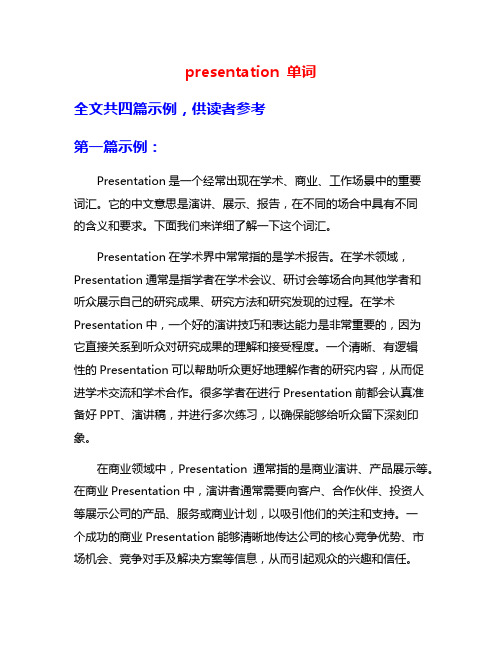
presentation 单词全文共四篇示例,供读者参考第一篇示例:Presentation是一个经常出现在学术、商业、工作场景中的重要词汇。
它的中文意思是演讲、展示、报告,在不同的场合中具有不同的含义和要求。
下面我们来详细了解一下这个词汇。
Presentation在学术界中常常指的是学术报告。
在学术领域,Presentation通常是指学者在学术会议、研讨会等场合向其他学者和听众展示自己的研究成果、研究方法和研究发现的过程。
在学术Presentation中,一个好的演讲技巧和表达能力是非常重要的,因为它直接关系到听众对研究成果的理解和接受程度。
一个清晰、有逻辑性的Presentation可以帮助听众更好地理解作者的研究内容,从而促进学术交流和学术合作。
很多学者在进行Presentation前都会认真准备好PPT、演讲稿,并进行多次练习,以确保能够给听众留下深刻印象。
在商业领域中,Presentation通常指的是商业演讲、产品展示等。
在商业Presentation中,演讲者通常需要向客户、合作伙伴、投资人等展示公司的产品、服务或商业计划,以吸引他们的关注和支持。
一个成功的商业Presentation能够清晰地传达公司的核心竞争优势、市场机会、竞争对手及解决方案等信息,从而引起观众的兴趣和信任。
很多企业会对员工进行相关的演讲技巧培训,以提高他们的演讲能力和表达能力,使他们能够更好地向外界展示公司的实力和潜力。
在工作场景中,Presentation也是非常常见的。
无论是在公司内部开会、向领导汇报工作成果、向同事分享经验,还是在外展示公司形象、推销产品,Presentation都是必不可少的。
一个好的Presentation能够帮助同事更好地理解你的工作内容和思路,促进团队合作和沟通;而一个成功的外部Presentation能够帮助公司留下良好的印象,促进业务的拓展和发展。
无论是在工作中还是在生活中,都需要具备一定的演讲能力和表达能力,以应对各种各样的场合和要求。
大学英语presentationPPT
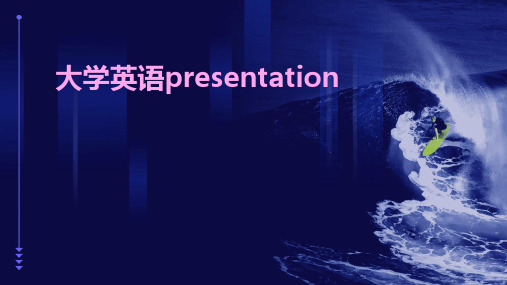
阅读英语杂志、观看英语电影和电视剧、学习英语歌曲、参加英语角等都是学习常用表达的途径。通过这些方法 ,可以积累常用的英语表达,提高口语水平。
参加英语角
总结词
利用英语角提高口语表达能力
详细描述
参加英语角可以与母语为英语的人交流,提高口语表达能力。在英语角,可以 结交新朋友,分享学习经验,提高自己的口语水平。
力材料。
听力是口语的基础
只有听懂别人说什么,才能做出正确的回 应。提高英语听力水平有助于提高口语表 达能力。
口语和听力相辅相成
口语和听力是相互促进的,你中有我,我 中有你。通过不断地练习口语和听力,可
以全面提高英语听说能力。
口语与阅读
01
口语有助于阅读理 解
通过大量的口语练习,可以增强 对英语语言的感觉,从而更容易 理解阅读材料。
目的
通过本次演讲,让听众了解英语演讲的重要性,掌握英语演讲的技 巧和方法,提高英语口语表达能力。
背景介绍
背景知识
英语演讲的历史可以追溯到古希腊和古罗马时期,当时人们通过演讲来传达信息、说服听众和建立自己的声誉。在现代社会,英语演讲已经成为职场、学术领 域和日常生活中不可或缺的一部分。
当前现状
在全球化背景下,英语演讲能力对于个人和国家的竞争力都至关重要。无论是在国际会议、商务谈判、学术研究还是旅游交流中,英语演讲能力都能帮助人们 更好地沟通、建立关系和取得成功。
02
阅读是口语的素材
阅读可以提供大量的语言素材, 包括词汇、句型、语法等,这些 都可以为口语表达提供支持。
03
口语和阅读相互促 进
口语和阅读是相互关联的,通过 不断地练习口语和阅读,可以全 面提高英语读写能力。
口语与写作
management presentation

Japan is known for its successful companies.In contrast to Western, in Japanese companies, profit is maximised by increasing sales and maximising volume by increasing productivity and efficiency. The question that arises is how could the Japanese increase productivity that much? One possible answer is the Japanese management approach. So there are seven reasons for their success.∙They have A Strong Company Philosophy and Culture: this point needs to be understood and embodied by all employees, and theyneed to believe in the work they're doing.∙Long-Term Staff Development and Employment :this point is in place to develop workers. Employment is usually long-term, andpromotion is steady and measured. This leads to loyalty from teammembers.∙Consensus in Decisions: Employees are encouraged and expected to take part in organizational decisions.∙Generalist Employees: Because employees have a greater responsibility in making decisions, and understand all aspects of theorganization, they should be "generalists."∙Concern for the Happiness and Well-Being of Workers∙Informal Control with Formalized Measures: Employees are allowed to perform tasks the way they see fit, and management is quite "hands off." However, there should be formalized measures in place to assess work quality and performance.∙Individual ResponsibilitySo this is why Japanese companies success, and I think these points have been used in many companies in western countries now. these points let our lives better and lighter.。
英文presentation范文
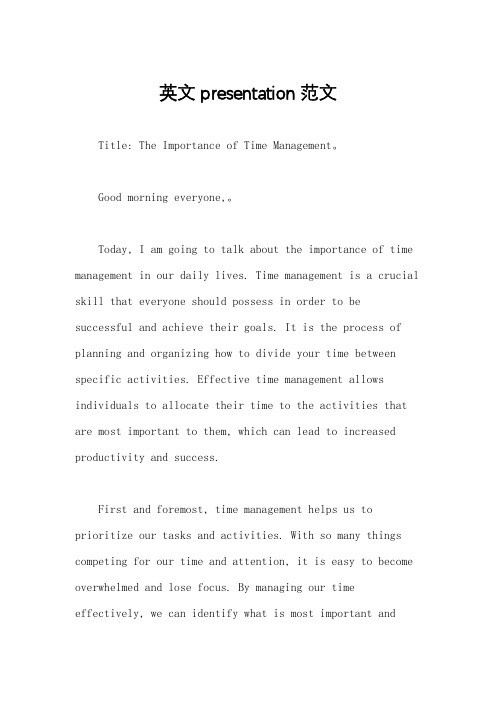
英文presentation范文Title: The Importance of Time Management。
Good morning everyone,。
Today, I am going to talk about the importance of time management in our daily lives. Time management is a crucial skill that everyone should possess in order to be successful and achieve their goals. It is the process of planning and organizing how to divide your time between specific activities. Effective time management allows individuals to allocate their time to the activities that are most important to them, which can lead to increased productivity and success.First and foremost, time management helps us to prioritize our tasks and activities. With so many things competing for our time and attention, it is easy to become overwhelmed and lose focus. By managing our time effectively, we can identify what is most important andallocate our time and resources accordingly. This allows us to focus on the tasks that will help us achieve our goals and be more productive in the long run.Additionally, time management helps us to reduce stress and anxiety. When we have a clear plan and schedule for our day, we are less likely to feel overwhelmed by the demands of our work and personal lives. By setting aside specific time for each task, we can approach our responsibilities in a more organized and systematic way, which can help to reduce stress and improve our overall well-being.Furthermore, effective time management can lead to increased efficiency and productivity. When we manage our time well, we are able to complete tasks more quickly and effectively, which can lead to greater success in our personal and professional lives. By prioritizing our tasks and eliminating distractions, we can focus on the most important activities and make the most of our time.In addition, time management allows us to create a healthy work-life balance. By allocating time for work,leisure, and personal activities, we can ensure that we are not neglecting any aspect of our lives. This can help to prevent burnout and improve our overall happiness and satisfaction.Finally, time management is an essential skill for achieving our long-term goals. By effectively managing our time, we can make progress towards our goals on a daily basis. This can help us to stay motivated and focused, and ultimately lead to greater success in our personal and professional lives.In conclusion, time management is a crucial skill that can have a significant impact on our lives. By prioritizing our tasks, reducing stress, increasing efficiency, creating a healthy work-life balance, and achieving our long-term goals, we can lead more fulfilling and successful lives. I encourage everyone to take the time to develop their time management skills and reap the benefits that come with it.Thank you for listening. Do you have any questions or comments?。
大学英语presentation

Description of the products
Differences between Chinese and American talk show
We still need more excellent ideas
Chinese talk show
Zhou Libo
Yang Lan
Guo Degang etc
• Contents
The talk show in China is similar to the foreign’ ,it developed and fired up in recent years. However, many parts of it need to be improved.
Chinese talk show
Let’s think about the three characteristics of zhou libo show:
His sounds
His words
The culture Of his show
We can see some differences compared with American talk show. It It also reflects some characteristics of Chinese talk show.
creativity Host style
Chinese characteristics Local characteristics, lack of common share
localization
Chinese characteristics, not on live
PRESENTATION范本

我们做presentation时不用怕了。
总结的真强大,转帖啦!来源:杨勇的日志转帖一成功英语演讲的秘诀:开场白、结束语应对问题-I will be pleased to answer any questions you may have at the en d of the presentation.-Please can you save your questions till the end.-If you have any questions, I will be pleased to answer them at th e end of the presentation.-there will be time at the end of the presentation to answer your q uestions-so please feel free to ask me anything then.-Don't hesitate to interrupt if you have a question.-Please feel free to interrupt me at any time.-Please stop me if you have any questions.-If you need clarification on any point, you're welcome to ask quest ions at any time.-Can I come back to that point later?-I will be coming to that point in a minute.-That's a tricky question.-We will go into details later. But just to give you an idea of...-I am afraid there's no easy answer to that one...-Yes, that's a very good point.-Perhaps we could leave that point until the questions at the end o f the presentation-I think I said that I would answer questions at the end of the pre sentation---perhaps you wouldn't mind waiting until then.-I think we have time for just one more question欢迎听众(正式)- Welcome to our company- I am pleased to be able to welcome you to our company...- I'd like to thank you for coming.- May I take this opportunity of thanking you for coming欢迎听众(非正式)- I'm glad you could all get here...- I'm glad to see so many people here.- It's GREat to be back here.- Hello again everybody. Thank you for being on time/making the e ffort to come today.- Welcome to X Part II.受邀请在会议上致词- I am delighted/pleased/glad to have the opportunity to present/ofmaking this presentation...- I am grateful for the opportunity to present...- I'd like to thank you for inviting/asking me/giving me the chance to...- Good morning/afternoon/evening ladies and gentleman- It's my pleasant duty today to...- I've been asked to...告知演讲的话题- the subject of my presentation is...- I shall be speaking today about...- My presentation concerns...- Today's topic is...- Today we are here to give a presentation on...- Today we are here to talk about...Before we start, I'd like you m eet my team members...- A brief look at today's agenda...(告诉听众所讲内容的先后顺序)- Before we start our presentation, let's take a brief look at the ag enda...- I shall be offering a brief analysis of...- the main area that I intend to cover in this presentation is...- Take a moment and think of...- Thank you for giving me the opportunity to tell you about...告诉听众发言的长度- During the next ten minutes, I shall...- I shall be speaking for about ten minutes...- My presentation will last for about ten minutes...- I won't take up more than ten minutes of your time...- I don't intend to speak for longer than ten minutes...- I know that time is short, so I intend to keep this brief- I have a lot to cram in to the next ten minutes, so I'd better ma ke a start...引起听众的兴趣- I'm going to be speaking about something that is vitally important to all of us.- My presentation will help solve a problem that has puzzled people for years...- At the end of this presentation you will understand why this com pany has been so successful for so long...- I am going to be talking about a product that could double your profit margins...- the next ten minutes will change your attitude to sales and mark eting...- Over the next ten minutes you are going to hear about somethin g that will change the way your companies operate...- By the end of this presentation you will know all there is to kno w about...告诉听众内容要点- there are five main aspects to this topic (...the first, ... the secon d, ...a third, ...another, ... the final)- I am going to examine these topics in the following order (...first, ...next, ...after that, ...finally)- I've divided my talk into five parts...- I will deal with these topics in chronological order...- I'm going to start with a general overview and then focus on this particular problem (...in general, ...more particularly).- I want to start with this particular topic, and then draw some mo re general conclusions from it (...specifically, ... in a wider context). - there are (a number of) factors that may affect...- We have to take into account in any discussion of this subject, th e following considerations.- We all ought to be aware of the following points.结束语-In conclusion, I'd like to...-I'd like to finish by...-Finally...-By way of conclusion...-I hope I have made myself understood-I hope you have found this useful-I hope this has given you some idea/clear idea/an outline of...-Let me end by saying...-That, then was all I had to say on...-That concludes our presentation...-I hope I've managed to give you a clearer picture of...-If there are any questions, I'd be delighted to...-Thank you for your attention...-Let's break for a coffee at this point-I am afraid that the clock is against us, so we had better stop he re-You have been a very attentive audience---thank you做presentation,我们要注意对话题的准备以及态度和身体语言等等,除此之外,我们还应该掌握一些常用句型。
新加坡国立大学交换生资料

交换生:在新加坡国立大学——写给法学院的师弟师妹们发表日期:2007年4月1日冬去春来又一个新学期,我在法学院办公室见到凌老师。
提到去年在新加坡国立大学的“交换”,老师兴致勃勃和我约稿,好谈谈作为“交换生”,尤其“国际”学生的体验。
三月正春风,我走在校道上,看柳绿花红,想这个时候的狮城岛国是什么模样。
新加坡是四季如夏的,过完雨季,现在应该是烈日炎炎的大旱天气。
国际之都,花园城市,新加坡总是茂盛的。
八月初到新加坡,第一印象便是从未见过的“葱郁”。
花开得饱满,树木参天,如画的背景里边,建筑也是红橙黄绿青兰紫的七彩缤纷…国庆日,车站满是标语,其中有一句,叫做“Identity&Unity”,忽然想或许这就是新加坡的风格。
东西文化在新加坡交汇。
别看新加坡小,气度却是非常豁达。
不同的种族在这里相处融洽:不论你是来自中国、马来或印度的血统,或是偶然从欧陆来访的游客,在这里都能够找到归属和亲切之感。
小印度、唐人街等区域,年复一年日复一日繁盛,每到节日便热闹非凡。
作为一个交换生(exchange student),到了这样一个不仅在经济上富庶,而且文化上丰富的国度,他的首要任务,便不在于“两点一线”的专业学习,而是所谓“eye opening, mind opening”:要去“开开眼界,长长见识”。
——碰上国庆庆典,他会想,新加坡如何会从亚洲儒教的根本,走向与基督文明的“中西合璧”,想如何使得“西学为体,中学为用”成为可能并且运作良好;遇到中秋节日,他会想在这个华人为主的社会,华裔后代对中国文化是什么态度,对自己的“本源”有怎样的“认同”感,而处于不同文化背景的欧美人对“东方文化”又是持怎样的观点……作为在新加坡的交换生,他还要意识到,自己所处的环境是与国内交换有所区别的。
在这里,他是一个“外国人”,他的黄皮肤和黑眼睛,和当地的新加坡人、马来人还是不同的,有一点不言自明:他,在某种程度上代表着他的民族、他的国家,是那里芸芸众生中被挑选出来的一员;他,理所当然是优秀的。
- 1、下载文档前请自行甄别文档内容的完整性,平台不提供额外的编辑、内容补充、找答案等附加服务。
- 2、"仅部分预览"的文档,不可在线预览部分如存在完整性等问题,可反馈申请退款(可完整预览的文档不适用该条件!)。
- 3、如文档侵犯您的权益,请联系客服反馈,我们会尽快为您处理(人工客服工作时间:9:00-18:30)。
• Law based on custom and usage and confirmed by the decisions of judges, as distinct from statutory law.
Privacy Common Law
• Common Law a product of social and cultural evolution:
Tangible and Intangible Property
• Tangible right
– Ownership of property physical and intellectual – Control of physical space protected by the 4th Amendment
What is Privacy?
• An intangible property right
– The right to be let alone – The right to be anonymous – The right to control who, when, where, and how information about us is shared – A recently recognized human right
• Right to property
– Tangible and intangible
Types of Privacy
• • • • • • • • • Bodily Privacy Locational Privacy Political Privacy Medical Privacy Genetic Privacy Internet Privacy Voter Privacy Family Privacy Religious Privacy
– As society changed and greater proximity of persons to each other created new opportunity for conflict and competition increased so did the need for new laws.
Pro-Privacy Statutory Law
• • • • • • • Children’s Online Privacy Protection Act 1998 Gramm-Leach-Bliley Act 1999 CAN-SPAM Act 2003 Fair and Accurate Credit Transaction Act 2003 Video Voyeurism Prevention Act 2004 Telephone Records and Privacy Protection Act 2006 Health Insurance Portability and Accountability Act 1996 • Identity Theft and Assumption Deterrence Act 1998
ห้องสมุดไป่ตู้
Pro-Privacy Statutory Law
• • • • • • • • Privacy Protect Act 1980 Cable Communication Policy Act 1984 Electronic Communications Privacy Act 1986 Computer Matching and Privacy Protection Act 1988 Employee Polygraph Protection Act 1988 Video Privacy Protection Act 1988 Telephone Consumer Protection Act 1991 Driver’s Privacy Protection Act of 1994
Privacy Protections in Torts Law
• • • • Public disclosure of private facts Intrusion upon Seclusion False Light Appropriation
Federal Privacy Case Law
The Right to Privacy a New Common Law Right
Lillie Coney Associate Director EPIC
Lillie Coney is Associate Director of the Electronic Privacy Information Center. EPIC is a public interest research center established in 1994 to focus public attention on emerging civil liberties issues and to protect privacy, the First Amendment, and constitutional values. /
• Intangible rights
– Right to be happy – Freedom from nuisance – Freedom from slander and liable
Pro-Privacy Statutory Law
• Fair Credit Reporting Act 1970 (public law 90-32, 15 U.S.C. Sec. 1681) • Privacy Act 1974 (public law 93-579, 5 U.S.C. Sec 552a) • Family Education Rights and Privacy Act of 1974 (public law 93-380, 20 U.S.C. Sec. 1221) • Right to Financial Privacy 1978 (public law 95-630, 12 U.S.C. Sec. 3401-3422) • Foreign Intelligence Surveillance Act of 1978 (public law 95-511, 15 U.S.C. Sec. 1801-1811)
Reasonable Expectation of Privacy
• The test: – A person must have exhibited an actual (subjective) expectation of privacy – The expectation be one that society is prepared to recognize as reasonable.
U.S. Constitution and Privacy
• 1st Amendment affords a right to speak anonymously, privacy in membership to groups, and travel privacy: “Congress shall make no law…abridging…the right of the people peaceably to assemble.” McIntyre v. Ohio Election Comm’n, 514 U.S. 334 (1995), NAACP v. Alabama, 357 U.S. 449 (1958), Shelton v. Tucker, 364 U.S. 479 (1960) • 3rd Amendment protects the privacy of homes: “No soldier shall, in time of peace be quartered in any house, without the consent of the owner, nor in times of war, but in a manner to be prescribed by law” • 4th Amendment provides a right of privacy in documents, materials, and records: “to be secure in their persons, houses, papers, and effects, against unreasonable searches and seizures, (Brandeis Dissent Olmstead v. United States, 277 U.S. 438 (1938) • 5th Amendment protects privacy by prohibiting the forced disclosure of personal information to government
Griswold v. Connecticut, 318 U.S. 478 (1965) – Court Declared that individuals have a constitutional right to privacy found in the “penumbras” or “zones” of freedom created by an expansive interpretation of the Bill of Rights Katz v. United States, 389 U.S. 347 (1967) – The 4th Amendment protects people and not places – Police must obtain warrants when searches take place in public locations like a phone booth Whalen v. Roe, 433 U.S. (1977) Privacy rights extended to the avoidance of disclosure of personal matters.
